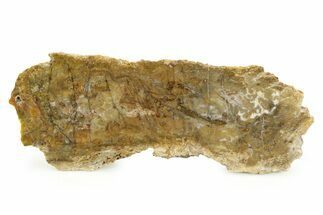11.4" Jurassic Petrified Wood Slab - Henry Mountains, Utah
This is a colorful, 11.4" wide, polished slab of petrified wood from the Morrison Formation of Utah. One side has been polished to a mirror like finish. It has beautiful coloration and unique patterning. The slab has a fiberglass backing for stability and comes with an acrylic display stand.
It was collected at Henry Mountain and is part of an old collection I recently purchased with some unique pieces from unusual localities. This beautiful slab of petrified wood is Upper Jurassic in age or approximately 150 million years old. The formation which it comes from is the same formation known for producing fossils of well known dinosaurs such as Allosaurus and Diplodocus. So this tree was living at the same time as the dinosaurs!
It was collected at Henry Mountain and is part of an old collection I recently purchased with some unique pieces from unusual localities. This beautiful slab of petrified wood is Upper Jurassic in age or approximately 150 million years old. The formation which it comes from is the same formation known for producing fossils of well known dinosaurs such as Allosaurus and Diplodocus. So this tree was living at the same time as the dinosaurs!
What Is Petrified Wood
Petrified wood is the name given to wood that has been turned into stone (fossilized) through the process of permineralization. In this process, all of the organic matter becomes replaced by minerals, while much of the original structure, such as tree rings, is retained. For this to happen, the wood needs to be buried in an environment low in oxygen to prevent decomposition and with flowing, mineral-laden water, so minerals may replace structures. The coloration is caused by various minerals/impurities present in the water during fossilization. For example, red colors in many cases can be attributed to iron compounds, greens due to copper, and so on.
Petrified wood is the name given to wood that has been turned into stone (fossilized) through the process of permineralization. In this process, all of the organic matter becomes replaced by minerals, while much of the original structure, such as tree rings, is retained. For this to happen, the wood needs to be buried in an environment low in oxygen to prevent decomposition and with flowing, mineral-laden water, so minerals may replace structures. The coloration is caused by various minerals/impurities present in the water during fossilization. For example, red colors in many cases can be attributed to iron compounds, greens due to copper, and so on.
$95
SPECIES
Conifer
LOCATION
Henry Mountains, Utah
FORMATION
Morrison Formation
SIZE
11.4 x 4.8", .45" thick
CATEGORY
SUB CATEGORY
ITEM
#253302
We guarantee the authenticity of all of our specimens.
 Reviews
Reviews











